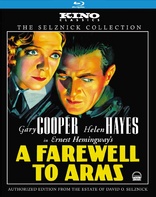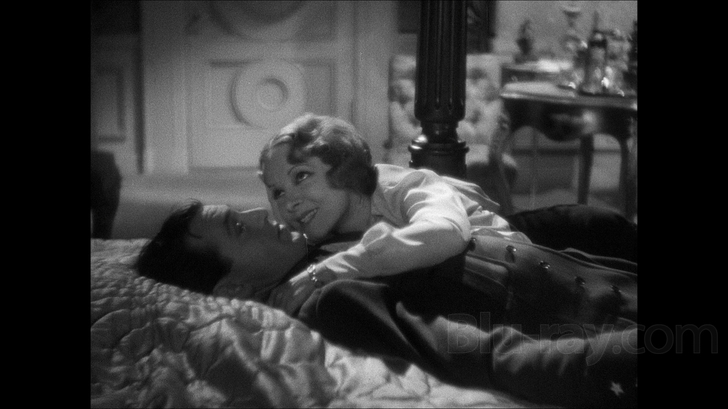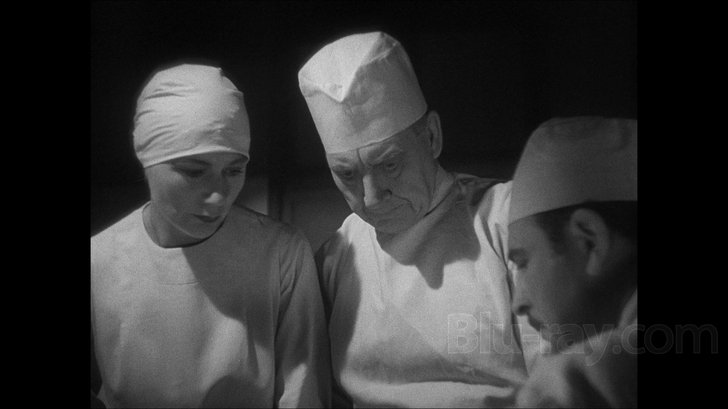A Farewell to Arms Blu-ray Movie
HomeA Farewell to Arms Blu-ray Movie 
Kino Lorber | 1932 | 89 min | Not rated | Dec 20, 2011
Price
List price:Amazon: $24.39 (Save 19%)
Third party: $24.39 (Save 19%)
Only 3 left in stock (more on the way).
Movie rating
6.7 | / 10 |
Blu-ray rating
| Users | 4.5 | |
| Reviewer | 4.0 | |
| Overall | 4.0 |
Overview
A Farewell to Arms (1932)
A tale of the love between ambulance driver Lt. Henry and Nurse Catherine Barkley during World War I. The action takes place in Italy and the two fall in love during the war and will stop at nothing to be together. The film also analyses Lt. Henry's feelings on war and the purpose of fighting.
Starring: Helen Hayes, Gary Cooper, Adolphe Menjou, Mary Philips, Jack La RueDirector: Frank Borzage
| Romance | Uncertain |
| Drama | Uncertain |
| War | Uncertain |
Specifications
Video
Video codec: MPEG-4 AVC
Video resolution: 1080p
Aspect ratio: 1.34:1
Original aspect ratio: 1.37:1
Audio
English: LPCM 2.0
Subtitles
None
Discs
25GB Blu-ray Disc
Single disc (1 BD)
Playback
Region A, B (C untested)
Review
Rating summary
| Movie | 4.0 | |
| Video | 4.0 | |
| Audio | 4.0 | |
| Extras | 1.0 | |
| Overall | 4.0 |
A Farewell to Arms Blu-ray Movie Review
One of the best Hemingway adaptations, even if Papa himself hated it.
Reviewed by Casey Broadwater December 28, 2011Ernest Hemingway’s relationship with Hollywood was begrudgingly accepting at best. He gladly took money for the rights to film his novels and short stories, but he openly disparaged most of the results as inaccurate, over-altered, or sentimentalized. He was especially hard on his first book-to-screen adaptation, director Frank Borzage’s take on A Farewell to Arms, written by Benjamin Glazer and Oliver H.P. Garrett. When the film shipped out in 1932, theater owners were given the choice of two different endings--a bleak, true-to-the-novel denouement, and a soft-peddled, more ambiguously optimistic finale. They were told to pick whichever one would suit the tastes of their local audiences, and Hemingway--as you might imagine--wasn’t pleased by this deference to the whims of bean-counting box office managers. Nor was he happy with the way the film needlessly alters events and downplays the wartime cynicism of the novel in favor of sweeping, melodramatic romance. The book, as usual, is better-- Hemingway’s authorial complaints are certainly valid--but taken as its own entity, Borzage’s A Farewell to Arms is a wonderful early talkie, with brooding cinematography and affecting performances by its two leads, Gary Cooper and Helen Hayes.

Cooper plays Frederic Henry, an American volunteer ambulance driver on the Italian front during World War I. As one of Hemingway’s so-called Code Heroes--and a stand-in for Hemingway himself, who based the novel on his own experience in the war--Frederic is brave and confident, a decisive man’s man and a walking model of grace under pressure. He’s fond of drinking and visiting whorehouses with his pal, Major Rinaldi (Adolphe Menjou)-- who calls him “baby,” like a studio mogul talking to a young starlet--but the carousing Frederic becomes a one-woman man when he takes shelter with virginal Red Cross nurse Catherine Barkley (Helen Hayes) during an air raid. It’s not quite love at first sight--Frederic is embarrassingly drunk--but they get a good, long second look at one another during an officer’s party, where Catherine is Rinaldi’s intended date. Frederic steals her away for some flirty conversation in an out-of-the-way churchyard, where he learns she was formerly engaged to a soldier killed in battle, and after sufficient wooing--and plenty of tomorrow we may die-style talk--they make love. (Off-camera, but unambiguously.) This isn’t just some wartime one night stand, though. Frederic and Catherine pledge themselves to one another, and struggle to keep their forbidden relationship hidden, especially from the jealous Rinaldi and Catherine’s disapproving best friend, Helen (Mary Philips), who thinks Frederic is nothing but trouble.
What follows is a series of dramatic separations and reunions as Frederic and Catherine are buffeted around in the unpredictable winds of war. Thinking he’s protecting his friend’s sanity, Rinaldi has Catherine transferred to a hospital in Milan, but Frederic inadvertently follows her there when he’s wounded in the leg by artillery fire. In a beautiful sequence filmed entirely from a first person perspective, Frederic is wheeled on a gurney into the hospital, his eyes staring up at the ornate ceiling. After he’s been rolled into his room, Catherine enters, rushes up to him, and practically kisses the camera lens, her face entirely filling the frame.
It’s worth noting that A Farewell to Arms was made before the Motion Picture Association of America began enforcing the Hays Code in 1934, which would generally restrict the depiction of “immorality” in the cinema. The film is surprisingly frank about sexual desire, and though no nudity is shown, Frederic and Catherine’s conversations are filled with ready allusions to sex. When they rent a plush hotel room in Milan, Catherine even begins nibbling on his chin and tells him, “I wish we could do something really sinful; everything we do feels so innocent and right.” Their relationship is legitimized somewhat when a caring priest (Jack La Rue) says the Latin wedding mass over them in secret, but this seems like a mere formality. It’s also one of the many changes made to soften the edginess of Hemingway’s novel, or Hollywood-ize it, adding a sweetness and hushed romanticism that isn’t really present in the book.
Still, the chest-clutching melodrama of the film is powerful and stops well short of being saccharine or weepy. As far as capital-R-Romantics go, director Frank Borzage (Seventh Heaven) was one of the best. As Andrew Sarris puts it in The American Cinema, “Borzage never needed dream worlds for his suspensions of disbelief. He plunged into the real world of poverty and oppression...to impart an aura to his characters, not merely through soft focus and a fluid camera, but through a genuine concern with the wondrous inner life of lovers in the midst of adversity.” And that sums up A Farewell to Arms, one of those noble war romances where love is a welcome distraction from the surrounding chaos, a source of purpose where meaninglessness reigns.
Gary Cooper and Helen Hayes make the perfect onscreen partners, and this may partially be due to the fact that Hayes had a massive, undisclosed crush on her co-star at the time. (She later revealed this in one of her autobiographies.) Their game-like coquetry in the first act soon morphs into something more serious--a mutually needed love--and by the time she’s in excruciating labor, hoping Frederic will show up for the birth of their child, we’re completely invested in their relationship.
The film’s Oscar-winning technical merits are also impressive, winning that year’s trophies for Best Sound Recording and Best Cinematography. The war montages, in particular, are stunning, with deep expressionistic shadows contrasted with bursts of light from exploding mortar rounds and dropped bombs. This almost painterly style would seem to be at odds with Hemingway’s staunch realism, but it works extremely well to concisely express the horror and confusion of the front.
A Farewell to Arms Blu-ray Movie, Video Quality 

Kino's Blu-ray editions of silent classics this year have been uniformly excellent, so it's great to see the company venturing into the 1930s and the advent of talkies. As a title in in the public domain, A Farewell to Arms has received many VHS and DVD releases, and is viewable streaming online via the Internet Archive, Netflix, and Hulu, but this new 1080p/AVC-encoded transfer of the film should be considered the definitive version for some time to come. What surprised me most is how clean the print is. There are some minor flecks and specks, and you'll notice a few hairs stuck in the gate at the bottom of the frame, but there are no major scratches, tears, debris, staining, or warpage. Borzage was somewhat known for romantic, softly filtered focus, so you shouldn't expect razor-edged sharpness, but the overall clarity is several notches above the other versions of the film I've seen--and I've sampled quite a few. The tonality of cinematographer Charles Lang's image is beautifully reproduced too, with deep blacks and crisp--but never overblown--whites. The relatively short film sits comfortably on a single-layer Blu-ray disc, and I didn't notice any overt compression or encode issues. Another wonderful release from Kino.
A Farewell to Arms Blu-ray Movie, Audio Quality 

The Blu-ray version of A Farewell to Arms features a Linear PCM 2.0 track sourced from the film's original mono mix. Obviously, the sound design is fairly primitive by today's standards, but you can see why the film won the Oscar for Best Sound Recording in 1933--the war montages feature planes roaring overhead and punchy bomb blasts. For it's time, I imagine it was quite a thrilling experience. Milan Roder's score also suits the film's varying shades of emotion excellently. As you'd expect from a film from this era, there are some light cracks and pops and hisses in the mix, but nothing distracting or unusual. What's most important is that dialogue is always easy to understand. Unfortunately, there are no subtitle options on the disc for those who might need or want them.
A Farewell to Arms Blu-ray Movie, Special Features and Extras 

Unfortunately, this release is rather slim on supplements, including only trailers for Nothing Sacred, A Star is Born, and Pandora and the Flying Dutchmen, along with a sixteen-image stills gallery.
A Farewell to Arms Blu-ray Movie, Overall Score and Recommendation 

Papa wasn't pleased with it, but Frank Borzage's A Farewell to Arms is one of the most memorable Hemingway adaptations, a gripping story of love in wartime. (As an interesting historical aside, Gary Cooper and Hemingway later became close friends--in the 1940s--and often spent vacations together until they died within two months of one another in 1961.) Kino's Blu-ray edition is short on supplements, but features a beautiful picture and period-accurate sound. Recommended!
Similar titles
Similar titles you might also like

A Farewell to Arms
1957

Love and Honor
Love & Honor
2013

Wings
1927

The Bitter Tea of General Yen
1933

War and Peace
1956

Gabriel Over the White House
Warner Archive Collection
1933

The Four Horsemen of the Apocalypse
Warner Archive Collection
1921

In Love and War
Warner Archive Collection
1996

Coming Home
Reissue
1978

In the Land of Blood and Honey
2011

Dark Journey
The Vivien Leigh Anniversary Collection
1937

For Whom the Bell Tolls
4K Restoration | Special Edition
1943

The Best Years of Our Lives
1946

Captain Corelli's Mandolin
2001

Grand Hotel
1932

The Four Feathers
1939

The Life and Death of Colonel Blimp
1943

Testament of Youth
2014

Downton Abbey: The Complete Series
2010-2015

Birdsong
Masterpiece Classic
2012